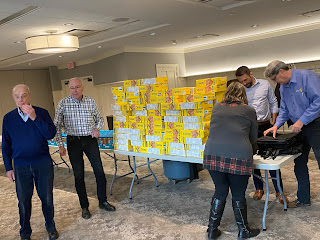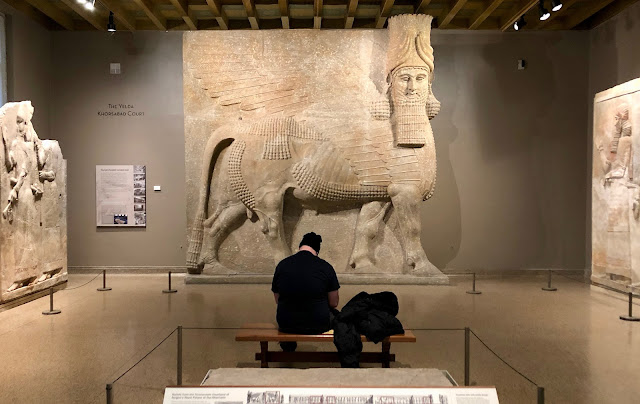 |
| Photos by Caren Jeskey |
There's so much in today's post by our esteemed Northshore bureau chief, the less I say by way of introduction, the better. Here it is, enjoy:
By Caren Jeskey
"maggie and milly and molly and mayLake glass and hunks of granite, silt, and sandstone are slowly taking over my tiny living room. When my brother and his girlfriend — who are visiting from California — wanted to stop by on Wednesday night I shouted “no!” in horror (via text). No one can see my place in such disarray. I have appearances to keep up, and I was too tired after a short but intense holiday work week of counseling to tidy up.
went down to the beach (to play one day)
and maggie discovered a shell that sang
so sweetly she couldn’t remember her troubles, and
milly befriended a stranded star
whose rays five languid fingers were;
and molly was chased by a horrible thing
which raced sideways while blowing bubbles: and
may came home with a smooth round stone
as small as a world and as large as alone.
for whatever we lose (like a you or a me)
it’s always ourselves we find in the sea"
— maggie and milly and molly and may by e.e. cummings
A warm November has beckoned many of us to the lake shore this past week. As soon as my last client and I disappear into nothingness from the new treatment room, Zoom, it’s time to go. Fanny-pack on, I dash out the door and head east. It’s essential to move quickly if one wants to beat the impossibly early sunset of late autumn in the Midwest. I make a deal with myself. I’ll only keep the rare finds of lake glass that I plan to incorporate into holiday gifts this year. I crouch down in a squat and scan thousands of pebbles placed there by the wind and waves. Many are pretty, especially when they are wet. Yet I ache for the satisfaction of the sudden gratifying glimpse of a morsel of smoothed, smokey glass. When one jovially appears, winking and saying "hey, there," I harvest it and drop the little gem into my pack. I’ve learned that as our waterways become cleaner and there is less waste, natural water glass will one day be a thing of the past.
If I’ve been crouching long enough and have lost all sense of time, when I wake back up I wonder if my musculature will be able to support my stiff body back into standing. Sometimes I sit on the damp beach, which is easier, but the words of one of my yoga teachers rings in my mind. She'd often sit in the sand in her home country of Brazil, legs spread-eagled, and lean forward with a book propped up in the sand in front of her. It was a good way to gain flexibility without even trying. Similarly, crouching is good for balance and flexibility, and it feels like a good thing to do. Even if it means I might get stuck there forever.
This week I instinctively sat back onto a low retaining wall to avoid a giant unexpected wave. I ended up with my rear end in a pool of cold water. I laughed aloud. I imagined that if an alien was studying humanoids from afar they might be very confused at what was happening down below. The next day I brought a little stool to sit on, and decided not to put myself between any retaining walls and the power of Lake Michigan again.
Even a hundred shards of glass will not fill up my pack. If I kept my promise (of lake glass only) there’d be no problem. But inevitably things go south. Before I know it, my the glass in my pack is joined by fossils, geodes, pottery shards, and who knows what else. Nothing on the beach is safe from obsessive collector Caren. My Grandpa Carl was like that too. He was the guy at the beach with the metal detector. My brother John followed in his footsteps, and as a teen had a detector of his own. I bet he got lost for hours too. I'll have to ask him.
The pockets of my jacket get heavy on my collecting sprees, and as my single-pointed focus continues, my pants pockets are compromised too. One day when I had pocketless yoga pants on, I tucked rocks between the fabric and my lower legs. Once all possible receptacles are laden with damp chunks that have been formed with “layers of sand, silt, dead plants, and animal skeletons,” aka rocks, I retreat back home. The long walk up the stairs from one of the North Shore beaches is harder with an extra several pounds. When I shared a photo of my lake finds with my friend Tup, he told me a story. “My mom was very down to earth, a loving and kind woman who loved the simple pleasures. [The man who] lived next door was kind of a grump. One time, across the fence, he asked my mom how I liked graduate school. My mom told him that I liked it but that it was a lot of hard work. Said [the neighbor], ‘well, anything worthwhile requires a lot of hard work and effort.’ My mom replied, ‘Oh, I don't know. I like to drive down to the Lake and watch the sunset and that doesn't require a lot of effort. I think that's worthwhile.’” Tup’s mom was a cool lady.
This holiday was perfect for my little family. Delicious food and a low-key dinner full of great conversation. My brother’s girlfriend Gail brought an O. Eugene Pickett poem to the table, a copy for each person. I’d printed them out and glued tiny pebbles to each one, then rolled them into scrolls tied with one of my favorite fibers, jute. Each of the eight of us read one of eight passages from the poem aloud. It seemed that each person got a passage that was just right for them.
Giving Thanks
a poem by O. Eugene Picket
“For the expanding grandeur of creation,
worlds known and unknown,
galaxies beyond galaxies,
filling us with awe
and challenging our imaginations:
We give thanks this day.
For this fragile planet earth,
its times and tides,
its sunsets and seasons:
We give thanks this day.
For the joy of human life,
its wonders and surprises,
its hopes and achievements:
We give thanks this day.
For our human community,
our common past and future hope,
our oneness transcending all separation,
our capacity to work for peace and justice
in the midst of hostility and oppression:
We give thanks this day.
For high hopes and noble causes,
for faith without fanaticism,
for understanding of views not shared:
We give thanks this day.
For all who have labored and suffered
for a fairer world,
who have lived so that others
might live in dignity and freedom:
We give thanks this day.
For human liberty and sacred rites;
for opportunities to change and grow,
to affirm and choose:
We give thanks this day.
We pray that we may live not by our fears
but by our hopes,
not by our words
but by our deeds.
We give thanks this day.”












